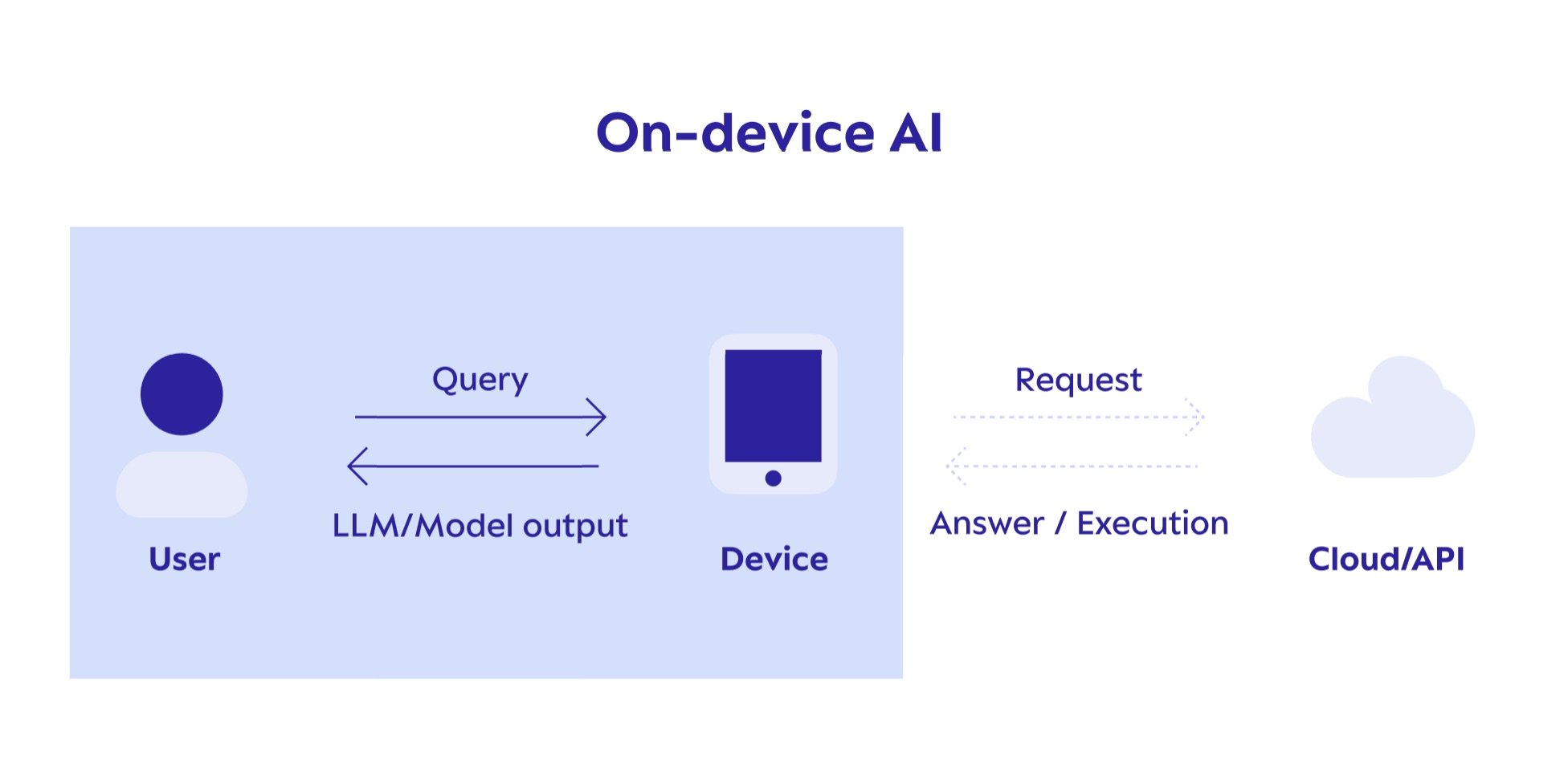Explore ‘On-Device AI’: AI without internet and cloud
2024/02/08 | Written By: Sungmin Park (Content Manager)What is On-Device AI?
On-device AI is a new methodology to improve privacy, personalization, and processing speed. This technology makes advanced LLMs applicable and scalable in resource-constrained environments. Many organizations are now trying to apply on-device AI technology into various devices such as smartphones, IoT devices, and VR/AR headsets.
The latest case is Samsung Electronics' Galaxy S24 series, a smartphone that employs on-device AI technologies for local data processing tasks. Galaxy S24 users have full controllability over how much they allow their data to enhance AI experiences, through advanced intelligence settings which can disable online processing of data for AI features.
On-Device AI can be applied in various sectors.
This technology trend is driven by concerns over individual privacy, and on-device AI is emerging as an alternative option to cloud-based AI. On-device AI runs locally on a device without an internet connection. This enhances privacy by avoiding data sharing with the cloud, while still providing personalized responses. For example, on-device AI ensures that AI assistants and chatbots run smoothly on various devices, so users can enjoy high-quality functions and make the most of their daily interactions with LLM applications. Let's take a deeper look into the benefits of on-device AI.
Benefits of On-Device AI
On-device AI processing
Improved Privacy and Security
On-device AI is designed to process data on the device itself, which means sensitive data does not need to be sent to an external server. This helps keep the data safe from various security threats. Users can secure personal information, such as financial and medical records, while organizations can prevent unauthorized access to confidential corporate information.
Faster Processing
Also, it is faster and more cost-effective to processing data, because there is no latency associated with data transmission, which can be a significant bottleneck when processing data remotely. This enables faster response for applications and a better overall user experience. Moreover, on-device AI does not require expensive cloud infrastructure and reduces the amount of data that needs to be transmitted over the internet, making it a more cost-effective solution for many organizations.
Enhanced Accessibility
On-device AI is powerful for offline capabilities. It can perform machine learning tasks without an internet connection unlike cloud-based AI. Users can leverage its benefits whenever and wherever they want. Also, on-device AI models can be applied across various devices and applications, improving accessibility.
Hyper-Personalization
Users can experience real-time, hyper-personalized services based on their individual preferences and daily routine. And of course, their data privacy and security would be guaranteed. As an example, if a user asks for advice on what outfit to wear, the on-device LLM could recommend the perfect style based on the weather and the user's typical fashion choices.
Real-world examples and use cases of On-Device AI
Home Appliances & Smartphones
AI company Upstage is partnering with LG Electronics to deploy a small language model (SLM) onto LG Gram laptops.
On-device AI is already being applied in our everyday devices, and more companies are looking to do more with it. As an example, AI company Upstage and LG Electronics recently announced a partnership to deploy a small language model (SLM) ‘Solar’ on LG Gram laptops. Solar is known for its compact yet high-performance design in various natural language processing (NLP) tasks. This strategic partnership aims to execute generative AI directly on end devices, such as personal computers (PCs) or smartphones. The integration will feature a small on-device LLM, also known as a small language model (SLM), built into the device itself. Customers worldwide could experience faster and more secure AI in the near future.
Also, Virtual assistants such as Apple's Siri and Google Assistant are widely used examples of on-device AI. They are commonly used for setting reminders, sending messages, and providing information about the weather or traffic, even without an internet connection. These on-device AI virtual assistants work by using pre-trained machine learning models that are stored locally on the device. When a user interacts with the virtual assistant, the device processes the input and uses the pre-trained models to understand and respond to the request. The models can be trained for various tasks, including natural language processing, image recognition, and sensor data analysis.
Healthcare
The on-device AI in wearable devices offer real-time insights and alerts for healthcare. Smartwatches and fitness trackers help users to monitor vital signs and detect early warning signs of health issues. Their algorithms can detect irregular heartbeats and alert the user to seek medical attention. Also they could provide personalized workout plans and suggest well-planned diets. When this technology is applied to medical devices, it can assist doctors in making quick and accurate medical diagnoses.
Autonomous vehicles
On-device AI is one of the key technologies for autonomous vehicles. It enhances the driving experience and contributes to the development of new industries, such as autonomous vehicles. It helps drivers make better decisions to avoid accidents, while autonomous vehicles use on-device AI to detect their surroundings and road conditions for safer driving.
Finance
Financial businesses leverage on-device AI technologies to detect suspicious activities and improve customer experience. By processing data locally on the device, on-device AI algorithms can help prevent financial losses and protect against identity theft. It is also useful for suggesting personalized financial products or improving customer support.
Transforming Business with the power of On-Device AI
On-device AI is transforming various industries in 2024. Bring this innovative technology to your business to offer differentiated AI-powered services anytime, anywhere. Upstage's SLM 'Solar' will be the perfect solution, as it’s lighter, smarter, and faster strength.
Build your on-device AI with our customizable, compact, yet powerful SLM






